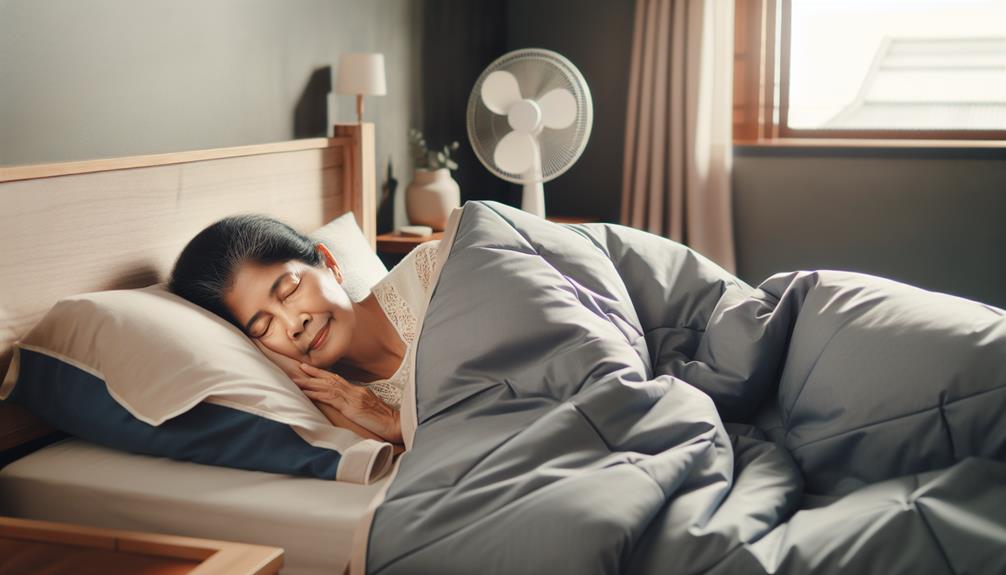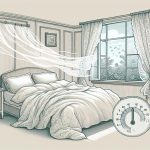As a hot sleeper, polyester may not be ideal. It traps heat and moisture. This can lead to discomfort and night sweats. Polyester lacks breathability, hindering airflow and temperature regulation. Consider fabrics like cotton or bamboo for better cooling. However, polyester does wick away moisture efficiently. It can aid in keeping you cool. Explore further to discover how natural fabrics like linen excel at providing breathability and comfort for hot sleepers.
Table of Contents
Key Takeaways
- Polyester traps heat and moisture, causing discomfort for hot sleepers.
- Limited breathability in polyester hinders air circulation and heat dissipation.
- Polyester's moisture-wicking properties can benefit hot sleepers by regulating body temperature.
- Natural fabrics like cotton and linen are preferred over polyester for hot sleepers.
- Polyester bedding may exacerbate allergies and has a significant environmental impact compared to natural materials.
Polyesters Heat Retention Concerns
Experiencing discomfort during sleep can be common for hot sleepers due to polyester's tendency to trap heat and moisture. As a hot sleeper myself, I've found that polyester bedding can lead to overheating and excessive sweating at night. The heat retention properties of polyester exacerbate these issues by locking in body heat and preventing proper airflow. This lack of breathability hinders the regulation of body temperature, making it challenging to stay cool throughout the night.
Unlike natural materials such as cotton or linen, polyester fails to provide the necessary ventilation to keep hot sleepers comfortable. The moisture trapped by polyester bedding can also contribute to a clammy and sticky feeling, further adding to the discomfort. For those like me who struggle with staying cool while sleeping, opting for bedding materials with better breathability and moisture-wicking properties may be more conducive to a restful night's sleep.
Breathability of Polyester Sheets
Polyester sheets lack breathability, hindering air circulation and moisture-wicking capabilities. This can lead to discomfort for hot sleepers due to increased heat retention and perspiration.
When seeking bedding options, considering materials like bamboo or cotton may provide better breathability for a cooler and more comfortable sleep experience.
Polyesters Air Circulation
Feeling stifled while sleeping under polyester sheets is a common issue due to their limited air circulation and lack of breathability. Polyester's air circulation is hindered by its synthetic composition, leading to heat retention and discomfort for hot sleepers. Here are some key points to take into account:
- The tight weave of polyester fabric restricts airflow, causing heat to get trapped.
- Polyester sheets tend to trap moisture, which can exacerbate night sweats.
- Hot sleepers may find polyester sheets less breathable compared to natural fibers like cotton or bamboo.
For a cooler and more comfortable sleep experience, hot sleepers are advised to opt for breathable materials such as cotton or bamboo over polyester.
Moisture Wicking Properties
With its moisture-wicking properties, polyester sheets effectively draw away moisture from the body, making them a suitable choice for hot sleepers. The breathability of polyester sheets promotes air circulation, assisting in regulating body temperature during sleep and preventing the buildup of sweat. This feature enhances comfort for those who tend to sweat at night, ensuring a more restful sleep experience.
Polyester sheets with moisture-wicking capabilities are specially designed to keep hot sleepers cool and dry, offering a solution for individuals seeking a comfortable sleeping environment. By incorporating these moisture-wicking properties, polyester sheets cater to the needs of hot sleepers by promoting breathability, preventing sweat, and facilitating air circulation for a more pleasant sleeping experience.
Temperature Regulation Characteristics
Despite its popularity, polyester sheets may not be the ideal choice for hot sleepers due to their limited breathability, which can trap heat and moisture, potentially causing discomfort during sleep. When contemplating temperature regulation characteristics, polyester lacks the natural breathability of materials like cotton, affecting its ability to keep hot sleepers cool. Here are some key points to ponder:
- Breathability: Polyester sheets inhibit airflow, leading to heat and moisture retention.
- Moisture-wicking: While some high-quality polyester blends offer moisture-wicking properties, they still fall short compared to natural fibers like cotton.
- Comfort: Hot sleepers may find polyester sheets less comfortable due to their limited breathability and temperature regulation capabilities.
Cooling Properties of Polyester Sheets
Polyester sheets, known for their lack of breathability and tendency to trap heat, may not be the most suitable choice for hot sleepers seeking bedding with effective cooling properties. Compared to natural fibers like cotton or linen, polyester sheets have limited cooling properties. They can retain body heat, causing discomfort for hot sleepers who are looking for a cooler night's sleep. The ability of polyester to regulate temperature and moisture is not as efficient as that of other materials. When it comes to selecting bedding for hot sleepers, polyester may not be the best option due to its constrained cooling capabilities.
| Cooling Properties of Polyester Sheets | |
|---|---|
| Lack of breathability | |
| Limited cooling compared to natural fibers | |
| Retains body heat | |
| Less effective in regulating temperature and moisture |
Durability of Polyester Sheets
Known for their robustness and resistance to wear and tear, polyester sheets are highly regarded for their durability and longevity in bedding. When considering the durability of polyester sheets, several key factors come into play:
- Wrinkles Resistance: Polyester sheets are known for their ability to maintain a smooth and wrinkle-free appearance, even after multiple washes.
- Shrink Resistance: Unlike some natural fibers, polyester sheets demonstrate excellent shrink resistance, ensuring they retain their original size and shape over time.
- Fade Resistance: Polyester sheets, especially those made from microfiber blends, exhibit remarkable fade resistance, preserving their color vibrancy through numerous wash cycles.
The combination of these qualities makes polyester sheets a long-lasting and durable bedding option, particularly suitable for those seeking bedding that can withstand the rigors of daily use without showing signs of wear and tear easily.
Maintenance Tips for Polyester Sheets
For proper care of your polyester sheets, remember to wash them in cold water with mild detergent to maintain their integrity. Avoid using bleach or fabric softeners as they can cause damage to the fabric.
When laundering polyester sheets, opt for a gentle cycle to prevent excessive wear. After washing, tumble dry the sheets on low heat or consider hang drying them to avoid potential shrinkage or damage. If ironing is necessary, use a low heat setting to prevent melting the polyester fibers.
Wicking Properties of Polyester Sheets
Polyester sheets are known for their moisture-wicking capabilities, which help keep hot sleepers dry and comfortable. The cooling effect of polyester sheets on the skin can enhance sleep quality by preventing sweat buildup.
Additionally, the breathability and comfort provided by polyester sheets make them a suitable choice for those who tend to perspire during the night.
Moisture-Wicking Capabilities
Having exceptional moisture-wicking capabilities, polyester sheets effectively draw moisture away from the body during sleep, promoting dryness and comfort for hot sleepers.
- Polyester's moisture-wicking abilities prevent sweat build-up, enhancing sleep quality for those prone to overheating.
- The wicking properties of polyester sheets contribute to a cooler and drier sleep environment, ideal for hot sleepers.
- Polyester's moisture-wicking features help regulate body temperature and reduce discomfort from night sweats, making it a good choice for hot sleepers.
Polyester's ability to draw away moisture guarantees a more comfortable sleeping experience by keeping hot sleepers dry throughout the night, allowing for better rest without disruptions from overheating.
Cooling Effect on Skin
Pulling moisture away from the skin, polyester sheets with wicking properties provide a cooling effect that helps keep hot sleepers comfortable throughout the night. The moisture-wicking ability of these sheets aids in regulating body temperature, preventing excess heat buildup during sleep. Advanced polyester technology can efficiently manage moisture and sweat, offering a invigorating cooling sensation on the skin. For hot sleepers seeking breathable and comfortable bedding, polyester sheets with wicking properties are an ideal choice. The cooling effect of these sheets promotes a restful and comfortable night's sleep, guaranteeing hot sleepers can enjoy a more relaxing and undisturbed rest.
| Benefits | Description |
|---|---|
| Cooling Effect | Provides a invigorating sensation on the skin, aiding in body temperature regulation |
| Moisture-Wicking | Draws moisture away from the skin, keeping hot sleepers dry and comfortable |
| Breathable Material | Allows for airflow, preventing overheating and promoting a comfortable sleep environment |
| Comfortable Sleep | Ensures a restful night's sleep by maintaining a cool and dry sleeping surface |
| Body Temperature Control | Helps regulate body temperature by preventing excess heat retention during sleep |
Breathability and Comfort
With limited breathability in polyester sheets, hot sleepers may experience heat retention issues, impacting their comfort levels during sleep. Polyester's wicking properties aren't as effective as natural materials like cotton or linen, hindering moisture-wicking capabilities.
This limitation can lead to a buildup of heat and moisture, making it challenging for hot sleepers to regulate their body temperature throughout the night. The heat retention in polyester sheets can cause discomfort, especially for those who tend to sleep hot.
To achieve better comfort and breathability, hot sleepers may find natural fiber sheets more suitable for their needs.
Allergies and Polyester Sheets
During hot summer nights, polyester sheets can worsen allergies for sensitive individuals by trapping allergens like dust mites and pet dander. This can lead to increased skin irritation and allergic reactions, making sleep uncomfortable for those with allergies or sensitive skin. Synthetic materials, such as polyester, are less breathable than natural fibers, creating an environment where allergens accumulate more easily. To combat this issue, allergy sufferers should consider switching to hypoallergenic bedding made from natural materials like cotton, bamboo, or silk. These alternatives are less likely to harbor allergens and are gentler on sensitive skin.
| Allergies and Polyester Sheets | ||
|---|---|---|
| Traps allergens like dust mites, pet dander, and pollen | Less breathable than natural fibers | Contains chemicals that may trigger skin sensitivities |
| Can exacerbate allergies in sensitive individuals | Potential for increased skin irritation | Opt for hypoallergenic bedding for a healthier sleep environment |
| Regular washing essential to minimize allergen buildup | Choose natural materials like cotton, bamboo, or silk |
Environmental Impact of Polyester Sheets
Polyester sheets present a significant environmental concern due to their slow biodegradability, taking up to 200 years to decompose. This poses a threat to ecosystems and sustainability.
The recycling challenge associated with polyester sheets further contributes to environmental waste and pollution. The manufacturing process of these sheets involves the use of toxic chemicals, exposing both workers and the environment to harm. In particular, polyester sheets release toxic formaldehyde gas, which not only affects indoor air quality but also adds to the environmental impact.
Their non-sustainable nature exacerbates these issues, making polyester a less environmentally friendly choice compared to other materials. Considering the environmental implications, it becomes vital to weigh the impact of using polyester sheets and explore more sustainable alternatives that align with eco-conscious practices.
Polyester Vs. Natural Fabrics for Hot Sleepers
Considering the environmental impact of polyester sheets, it's evident that natural fabrics like cotton, linen, wool, and silk present superior choices for hot sleepers seeking comfort and breathability. Polyester, lacking breathability, traps warm air and moisture, causing discomfort for those prone to overheating during sleep.
On the other hand, natural fabrics such as cotton and linen excel at regulating body temperature, making them ideal for hot sleepers. While cotton is highly breathable, its tendency to stay damp once wet may not suit everyone. Linen, conversely, stands out as the best option for hot sleepers due to its natural porosity, high absorbency, and ability to promote air circulation.
Not only does linen offer excellent breathability, but it also contributes to eco-friendliness, making it a top choice for those concerned about sustainability. When it comes to choosing bedding materials for hot sleepers, natural fabrics like linen clearly outshine polyester with regard to breathability, comfort, and environmental impact.
Conclusion: Best Sheets for Hot Sleepers
I find that the breathability factor of polyester sheets is a key consideration for hot sleepers.
While polyester lacks the cooling properties of natural fabrics like linen, it may not be the best choice for those looking to stay cool at night.
Opting for bedding made from materials like cotton, linen, or bamboo can provide hot sleepers with the breathability and moisture-wicking properties necessary for a comfortable night's rest.
Polyesters Breathability Factor
Exploring the breathability of different sheet materials reveals essential insights for hot sleepers seeking ideal comfort. When considering the breathability factor of polyester sheets for hot sleepers, it's important to recognize that polyester isn't the most breathable fabric and may trap heat and moisture.
To enhance comfort and promote better sleep, hot sleepers should opt for materials like cotton, linen, or bamboo that offer superior air circulation and heat regulation. Additionally, selecting cooling fabrics such as Tencel, bamboo, or silk sheets can create a more breathable sleep environment.
For a balance of durability and breathability, hot sleepers may also consider polyester blend sheets with natural fibers that provide better heat-regulating properties for optimal comfort.
Cooling Properties of Polyester
Polyester sheets, despite their popularity, may not be the best choice for hot sleepers seeking enhanced comfort and temperature regulation. When it comes to cooling properties, polyester bedding lacks breathability and moisture-wicking capabilities, leading to trapped heat and disrupted sleep for hot sleepers. Natural materials like cotton, linen, and bamboo are more recommended for their superior breathability and cooling effects.
Fabrics such as bamboo, Tencel, and silk outperform polyester regarding cooling properties. To guarantee top comfort and temperature regulation during sleep, hot sleepers should prioritize materials like linen or percale over polyester bedding. Choosing the right sheets can make a significant difference in maintaining a comfortable sleep environment for those who tend to get warm at night.
Frequently Asked Questions
Is Polyester Too Hot to Sleep In?
Polyester is not ideal for hot sleepers. It lacks breathability, traps heat, and can cause discomfort during sleep. Opt for natural materials like cotton, linen, or bamboo for better heat dissipation and a more comfortable night's rest.
What Fabric Is Best for Hot Sleepers?
For hot sleepers, natural fabrics like linen and bamboo excel due to breathability and moisture-wicking properties. Polyester, being less breathable, traps heat and can cause discomfort. Opt for cotton over polyester for better sleep quality.
Is Polyester or Cotton Better for Hot Sleepers?
For hot sleepers, cotton surpasses polyester due to its breathability and moisture-wicking. Cotton, like percale, offers a cool, smooth experience, perfect for summer nights. Polyester, trapping heat and moisture, lacks the comfort hot sleepers need.
Is It Better to Sleep on Cotton or Polyester?
I prefer sleeping on cotton because it regulates my body temperature and keeps me cool throughout the night. Polyester doesn't offer the same breathability and moisture-wicking properties, making it less ideal for hot sleepers like me.







